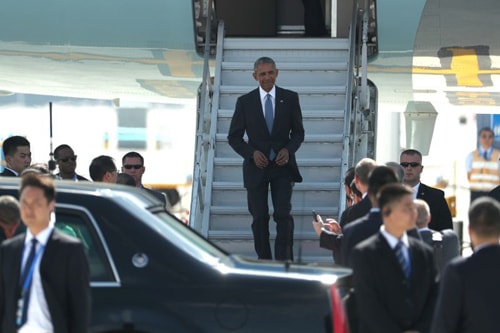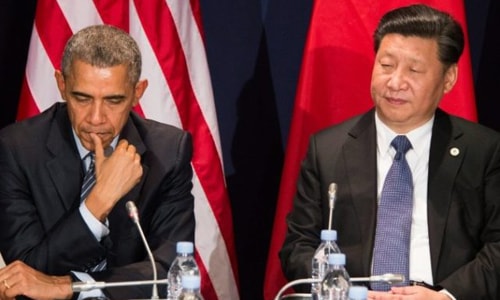Obama's red carpet incident signals a bumpy future for US-China relations
China's reception of Mr. Obama in Hangzhou shows that tensions in US-China relations will be difficult to resolve in the near future.
 |
| Mr. Obama landed at Hangzhou airport using the plane's ladder. Photo: Reuters |
US President Barack Obama had a rough start to his trip to Hangzhou, China to attend the G20 summit. He came to China this time hoping to promote US-China relations, but according to analysts, a series of incidents that occurred on the first day signaled storms ahead.
While other heads of state were given a red carpet to the foot of the stairs when they got off the plane in Hangzhou, Obama left Air Force One using a normal airplane ladder. Immediately afterwards, a dispute broke out between a Chinese security official and American journalists and officials who tried to approach Obama at the foot of the stairs.
While an unnamed Chinese official said that the reception of Mr. Obama by normal stairs without a red carpet was at the request of the US Secret Service, many observers expressed doubts about this.
"The way President Obama and his entourage were received when they arrived in China was offensive, even by Chinese standards," commented the NYTimes.
Jorge Guajardo, a former Mexican ambassador to China who worked with the Chinese for six years, said Beijing had a “deliberate calculation” in its treatment of Obama and the US delegation. “These things don’t happen by accident, at least not to the Chinese,” he said. “It’s an insult, a way to say, ‘You’re nothing special to us.’ This is a new kind of Chinese arrogance, as a way to show that China is a superpower.”
Although Mr. Obama has stated that this incident should not be "overstated," Washington Post commentator David Nakamura said that what happened in Hangzhou reflects the relationship between the two powers. Over the past 7 years, the relationship between the two countries has become increasingly tense and has greatly shaped Mr. Obama's foreign policy in Asia.
Tense past
Obama has always been a man who hopes to improve US-China relations. In 2009, he was the one who sought to approach the Chinese leadership when he proposed that the two countries increase contact. He decided not to meet with the Dalai Lama to avoid angering Beijing, and became the first US president to visit China in his first year in office. However, Obama's visit was controlled by China in almost every aspect.
“He was not allowed to say much,” said Orville Schell, a veteran China scholar. “The Chinese only let him meet with certain people… Obama didn’t know how to react, because he didn’t want to be seen as rude. It took a while for the US to understand that this was the direction China was going in its relations with them.”
Some people think that Mr. Obama took an overly optimistic and open stance towards China in the early years of his term. American diplomats, both former and current, say that Mr. Obama's approach has not achieved much, except the feeling of being "burned" by Beijing.
Nakamura believes that after surviving the global financial crisis in the late 2000s unscathed, China began to feel the power of the world's second largest economy, and began to change its foreign policy, including its approach to the United States.
Beijing is no longer willing to make concessions on international issues, from big issues like territorial disputes to details like who sits where and what is said in diplomatic exchanges.
According to Jeffrey A. Bader, this behavior of China made the US realize that its "carrot" policy had failed, and Washington decided to apply a "stick" policy, concretized by the "Asia rebalancing" strategy initiated by the Obama administration.
Bumpy future
 |
| President Obama and Chinese President Xi Jinping. Photo: Breitbart |
China sees the US “pivot to Asia” as a way to contain its rise, and tensions between the two countries continue to escalate, especially as Beijing becomes increasingly assertive in the South China Sea. Both countries have sought to avoid overt hostility, but have grown increasingly concerned and frustrated with each other.
Things did not improve during Obama’s trip to Hangzhou. After the airport controversy, later in the day, foreign policy officials and members of the US delegation were blocked by Chinese security as they entered the diplomatic compound ahead of Obama’s important meetings there. They had to argue with Chinese security personnel before being allowed inside.
A scuffle also nearly broke out between a Chinese official who tried to help the American diplomats and a local security officer who tried to stop them. "Calm down, please, calm down," a White House official was heard to say.
Twenty minutes before Obama met with Chinese President Xi Jinping, the two sides were still arguing about the room where the two leaders would talk. The Chinese side argued that the room did not have enough space for the 12 American journalists accompanying the delegation, while the US side insisted that they could still accommodate reporters, saying the issue had been agreed upon long ago.
Nakamura said the arguments and disagreements that took place on Saturday were a testament to the differences in the two sides' perceptions of each other, and that things have hardly changed since Obama's first visit to China in 2009. Washington and Beijing still have many disagreements, from maritime issues, cybersecurity, trade to human rights.
This could be Obama's last visit to China as US President, and what happened at this G20 summit shows that US-China relations will be the biggest problem his successor will face in Asia, Bader commented.
“How the next US president deals with China – the extent of the sticks and carrots Washington chooses and Beijing’s response – will certainly shape the Asian region in the coming decade,” Nakamura stressed.
According to VNE
| RELATED NEWS |
|---|

